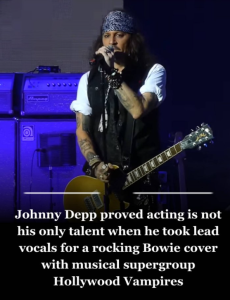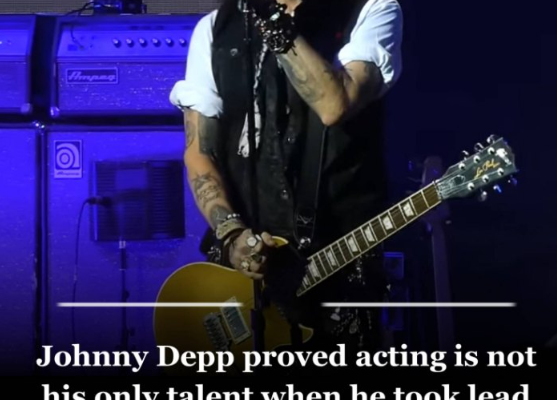Johnny Depp



When Johnny Depp stepped into the spotlight with a cover of David Bowie’s iconic “Heroes”, the reaction from fans and critics alike was immediate, and for good reason. It’s not every day that an actor-turned-rocker (albeit with serious musical chops) takes on a song so deeply woven into rock history — and makes you believe he’s channeling its spirit, rather than simply performing it.
Setting the Stage: From Hollywood to the Rock & Roll Arena
Depp isn’t exactly new to the music world. His rock super-group Hollywood Vampires — alongside Alice Cooper and Joe Perry — has been around since 2015. The band’s second studio album, Rise (released June 2019) features a cover of “Heroes” with Depp on vocals. So this wasn’t a one-off experiment: it’s part of a serious musical direction.
The choice of “Heroes” is significant. Bowie’s original, released in 1977, has become a rock anthem — enduring, layered with meaning, and notoriously difficult to follow in any cover that hopes to capture its resonance. Which makes Depp’s attempt all the more daring.
The Performance: What Made It Stand Out
What struck people most about Depp’s version was the blend of reverence and reinterpretation. He doesn’t attempt to imitate Bowie’s voice or inflection mechanically; rather, he seeks to embody the emotional thrust of the song — its yearning, its dramatic tension, its sense of hope against odds. On stage (as captured in live videos from Paris, San Francisco, etc.), the arrangement swells, the guitar lingers, Depp’s voice carries a raw quality.
Fans were quick to praise the performance. One social media post observed:
“Johnny Depp delivered a rocking cover of Bowie’s ‘Heroes’ that fans are saying the man himself would have loved.”
That kind of tribute-level acknowledgment suggests that Depp didn’t just pick the song for fun — he chose it knowing its weight, and aiming to honour it.
The Interpretation: Tracing the Threads
Let’s break down what I think Depp’s rendition brings to the table:
-
Vocal tone: He brings a slightly husky, lived-in vocal style that isn’t polished to a sheen — it gives the song an edge, a sense of authenticity and vulnerability.
-
Tempo & arrangement: The live versions tend to prolong the build-up, letting the guitars breathe, letting the audience feel the tension before the chorus hits. That mirrors the original’s architecture but allows for expansion.
-
Emotional connection: There’s an evident sense of respect for Bowie’s legacy, combined with a desire to make the song his own. Rather than a carbon copy, it’s a reinterpretation through his prism as a performer and musician.
In short — Depp doesn’t overshadow the song; he steps into its world and invites us along.
Why It Resonates Today
Why does a cover like this matter? A few reasons:
-
Legacy meets reinterpretation: Bowie’s “Heroes” is not just another track. It’s widely covered because it captures a universal yearning — “we can be heroes, just for one day”. As the Wikipedia article notes, it’s one of Bowie’s most covered songs. Depp stepping in means that legacy remains alive, but also evolving.
-
A crossover of mediums: Depp is best known as an actor. When someone known for one kind of art moves credibly into another, it challenges audience expectations. But because he’s been involved musically for years, it’s less novelty and more genuine craft.
-
Emotional timing: For many fans, cover versions are a way to reconnect with the original, to experience it anew. In an era where nostalgia and reinvention often go hand in hand, a strong cover can feel both familiar and fresh.
Critical Notes & Reception
While the response was largely positive, it’s fair to note some caveats:
-
Some purists will always compare any cover to the “definitive” original and find it lacking. After all, Bowie’s version carries more than 40 years of cultural weight.
-
The live context matters. Studio versions and live performance feel different. Some fans may prefer more stripped-down takes; others may embrace the full rock roar.
-
Because Depp’s persona is so well-known, there’s always the risk that the performance becomes about the star rather than the song. The strength here is that many believe he kept the focus on the song. Hence comments like “fans are saying the man himself would have loved it.”

Why This Covers Stands Out Among Many
Covering “Heroes” isn’t new — many artists have done it. But what makes Depp’s version memorable:
-
Authenticity: He doesn’t feel like a guest vocalist tokenizing the song; he’s claiming it.
-
Context: Released as part of a serious rock album by a band with legit musicians (Hollywood Vampires), not a one-off celebrity moment.
-
Live energy: Videos show the audience response, the moment of recognition when the opening guitar riff hits, the crowd reacting — these enhance the impact.
-
Respect for the original: There’s no parody or gimmick. It leans into the song’s epic swirl of emotion. That earns respect from longtime Bowie fans.
The Bigger Picture: Musical & Cultural Significance
This cover illustrates a few broader themes in music and culture:
-
Intergenerational bridges: Young fans discovering Bowie through newer voices; older fans hearing a beloved classic rekindled in new light.
-
The role of covers in legacy management: Artists like Bowie build huge catalogues; covers help keep songs alive, re-interpreted, and relevant.
-
Celebrity and craft convergence: When someone known for one domain (acting) brings genuine skill to another (music), it blurs the lines between “celebrity” and “artist”. Depp is part of that convergence.
-
The moment of live performance as ritual: Videos of live covers become communal moments online, shared by fans across borders, building new layers of meaning.
What It Tells Us About Johnny Depp
This performance gives insight into Depp the musician — not just Depp the movie star. It suggests:
-
He takes music seriously, not as a side gig.
-
He’s invested in rock history and legacy (choosing Bowie’s “Heroes” is no accident).
-
He is capable of vulnerability and emotive delivery — both musically and personally.
-
He doesn’t shy away from challenge. Tackling a song so iconic invites scrutiny — and he embraced it.
In Conclusion
Johnny Depp’s cover of “Heroes” is more than a celebrity cameo—it’s a credible, stirring tribute, and a statement. It connects past and present, honors one of rock’s great songs, and invites listeners to hear it again with fresh ears.
When Depp sings “We can be heroes, just for one day”, the moment resonates. The guitars swell, the crowd leans in, and for a time, something transcendent happens. It’s a reminder that music is alive—not static—that songs evolve, voices reinterpret, and meaning shifts.
Whether you’re a Bowie devotee, a Depp fan, or someone simply moved by a powerful performance, this cover invites you in. It asks: What does it mean to be a hero, just for one day? And maybe, just maybe, it suggests that in the act of singing, of standing up and reaching out, we already are.

